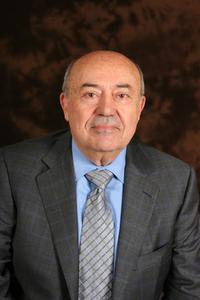Andrew Viterbi, Wireless Pioneer and UC San Diego Professor Emeritus, Wins National Medal of Science
San Diego, Oct. 1, 2008 -- Wireless pioneer, Calit2 Advisory Board member and UC San Diego professor emeritus Andrew Viterbi received a National Medal of Science, in part for work that would become known as the Viterbi algorithm. This algorithm is used in virtually every cell phone today where it performs interference suppression and efficient decoding of digital transmission sequences. Viterbi also made important contributions to the Code Division Multiple Access (CDMA) wireless technology that transformed the theory and practice of digital communications.
|
Viterbi is one of the founders of Linkabit, the famed San Diego startup, and co-founder of Qualcomm as well. One of Viterbi’s co-founders in both companies was Irwin Jacobs, who took home a National Medal of Science of his own in 1994.
“Andrew Viterbi’s impact in wireless communications has been utterly profound. Virtually every cell phonein use today employs the Viterbi algorithm—which is a clever technique for decoding a signal that is corrupted by noise during transmission,” said Larry Larson, professor and chair of the Department of Electrical and Computer Engineering at UCSD’s Jacobs School of Engineering.
As wireless signals are transmitted through the air, they pick up noise and interference. By the time a signal gets to the cell phone, it is just an echo of the original signal. The Viterbi algorithm provides an elegant way to recover the original signal and throw away the noise.
“Through the Viterbi algorithm and his co-founding of Qualcomm, Andy Viterbi has had a seminal influence on the building blocks of the wireless revolution,” said Ramesh Rao, director of the UCSD division of the California Institute for Telecommunications and Information Technology (Calit2) and a Jacobs School professor of electrical engineering. “We are very lucky to have Andy as a member of the Calit2 Advisory Board. As an information theorist himself, he has been a supporter from day one of our Information Theory and Applications Center, which seeks to apply the methods embodied in information theory to other disciplines, especially systems biology.”
The Viterbi Algorithm
“In the early days of digital communications, people knew you could pull the corrupted signal out of the noise, but it was impractical to do so because it would take racks and racks of computers. The Viterbi algorithm accomplished the same thing with just a fraction of the hardware of some traditional noise reduction algorithms,” said Larson, a member of UCSD’s Center for Wireless Communications.
The Viterbi algorithm is still used in much the same way as it was originally invented. What has changed are the hardware requirements to run it.
“When first invented, the Viterbi algorithm was incredibly efficient but still took a big computer to run it. Now the same algorithm can be implemented on a tiny sliver of silicon. It’s now so easy to implement. I think the Viterbi algorithm is like addition and subtraction: we’ll still be using it in a thousand years,” said Larson.
When space exploration probes send messages back from Jupiter, for example, researchers use the Viterbi algorithm to decode the signals and remove the noise after millions of miles of travel.
As a Qualcomm co-founder, Andrew Viterbi has also made a major impact with his work on the CDMA standard. CDMA allows many users to share the same radio frequencies, and thereby increase system capacity many times over analog system capacity.
“Viterbi was one of the first to realize that CDMA would be good for cell phones,” said Larson. CDMA is universally accepted as the third generation wireless standard and is used throughout the world where it has transformed the theory and practice of digital communications.
Viterbi received his bachelor’s and master’s degrees from MIT, and his Ph.D. in digital communications from the University of Southern California (USC). In 2004 Andrew and Erna Viterbi committed $52 million to USC’s engineering school, which was renamed in their honor.Viterbi was a member of the communications research section of the California Institute of Technology Jet Propulsion Laboratory, where he was one of the first communication engineers to recognize the potential of digital transmission techniques for space and satellite telecommunication systems.He served as a professor at the UCLA School of Engineering and Applied Science until 1973 and continued teaching on a part-time basis at the University of California , San Diego until 1994. He is currently a professor emeritus at UCSD’s Jacobs School of Engineering.
“Andy was a very tough teacher here at UCSD. He had very high standards, and his courses were greatly appreciated by the students,” said Jack Keil Wolf, a professor in the Department of Electrical and Computer Engineering at UCSD’s Jacobs School of Engineering and a long-time member of UCSD’s Center for Magnetic Recording Research.
Media Contacts
Daniel Kane, Jacobs School of Engineering, 858-534-3262, dbkane@ucsd.edu


